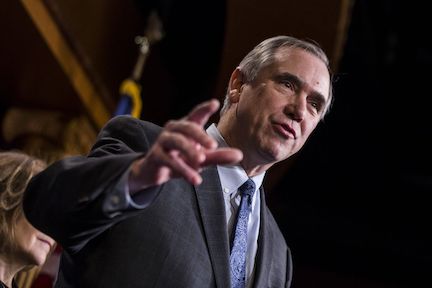Democrats propose tax on carbon-intensive imports in budget
Senate Democrats are moving to impose tariffs on carbon-intensive imports as a way to help pay for their tax-and-spending legislation, according to a person familiar with the plan.
The measure is included in a $3.5 trillion budget blueprint developed by Senate Democrats as a way to advance major Biden administration policy initiatives, including addressing climate change, expanding Medicare and reforming immigration.
The plan also includes expanding tax credits for renewable energy and electric vehicles as well as the creation of a clean energy standard that could mandate utilities generate carbon-free power.
Senator Jeff Merkley of Oregon said in an interview Wednesday that “there is a lot of support for this idea” of a border adjustment tax on high-carbon products.

The size and scale of the potential “polluter import fee,” as it was described in a summary document, were not immediately clear. But the plan dovetails with efforts by other countries—including the European Union—to use trade policy as a tool for curbing greenhouse gas emissions.
Supporters of the tax include former Vice President Al Gore, who said in an interview on Wednesday with Bloomberg Television that a border adjustment tax was a “point of dialogue” between the European Union and the U.S.
“I’m all in favor of that,” said Gore, who wrote and appeared in the 2006 landmark documentary “An Inconvenient Truth,” and is now chair of investment firm Generation Investment Management. “Because if a nation like ours, for example, takes steps that account for carbon pollution and then some other country says ‘no, we don’t pay any attention to that,’ there ought to be a border adjustment. The European Union is moving aggressively in that direction. I think that is the way to go.”
On Wednesday, the EU introduced its own border adjustment blueprint, with an import levy on steel, cement and aluminum produced in other countries with less-stringent environmental controls.
In a communique last weekend, G-20 finance ministers recognized carbon pricing as a potential tool to combat climate change. Biden administration officials also have been considering the approach, which could protect domestic workers and give an advantage to U.S. manufacturers producing goods with fewer emissions than foreign competitors.
Interest in a tariff on carbon-intensive imports has gained ground in Washington and around the world, as a way to encourage slow-moving countries to crack down on their own greenhouse gas emissions.
Creating a new carbon tariff system would require navigating thorny trade policy and domestic policy considerations, which industries and products would be taxed, how to assess the amount of carbon embedded in imported goods and, potentially, how to judge the policies of countries supplying them.
The goal would be a tax regime that creates a level playing field for U.S. companies, including which don’t pay an explicit carbon tax but must comply with regulations that impose a de facto price on carbon. U.S. exports to countries with less stringent climate policies could even receive rebates.
Similar Stories

Amaero secures final approval for $23.5M loan from Export-Import Bank
View ArticleU.S. Bureau of Labor Statistics employment situation
Total nonfarm payroll employment increased by 256,000 in December, and the unemployment rate changed little at 4.1 percent, the U.S. Bureau of Labor Statistics reported today. Employment trended up in…
View ArticleImport Cargo to remain elevated in January
A potential strike at East Coast and Gulf Coast ports has been avoided with the announcement of a tentative labor agreement, but the nation’s major container ports have already seen…
View ArticleS&P Global: 2025 U.S. transportation infrastructure sector should see generally steady demand and growth
S&P Global Ratings today said it expects activity in the U.S. transportation sector will continue to normalize in 2025, with growth rates for most modes of transportation slowing to levels…
View Article
CBP officers seize counterfeit Tiffany & Co. jewelry
View ArticleAAFA applauds USTR on the 2024 Review of Notorious Markets for Counterfeiting and Piracy report
Reiterates need for accelerated efforts to stop dangerous fakes
View ArticleGet the most up-to-date trending news!
SubscribeIndustry updates and weekly newsletter direct to your inbox!





